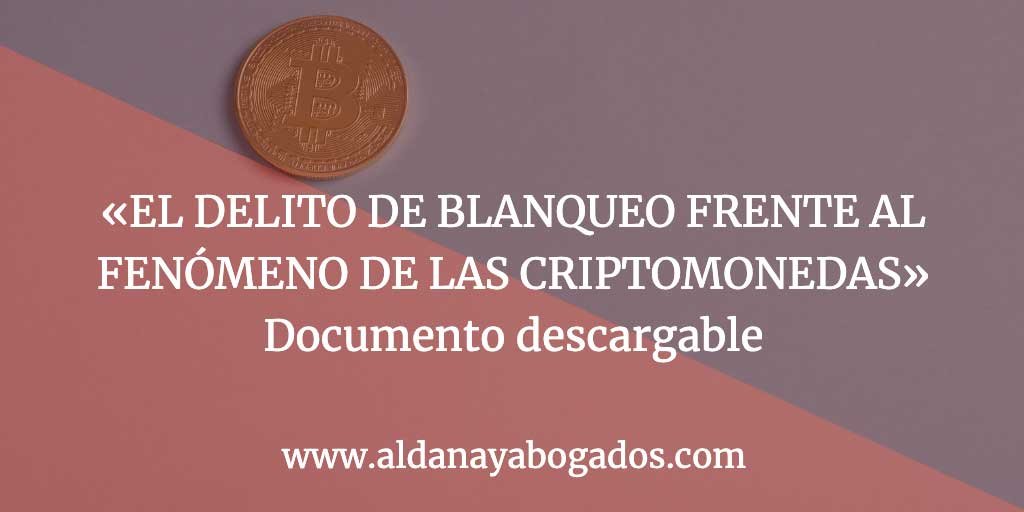The arrival of cryptocurrencies on the global economic and financial scene entails changes that have required the revision of the legal foundations that have legislated in the area so far. The quality of the cryptocurrency system to exclude the supervision of state bodies in the process of value exchange, is an attraction for money laundering offenses. This is why intergovernmental organizations such as the Financial Action Task Force (FATF) have promoted a compendium of recommendations to be applied to protect the credit systems of the national, regional and, consequently, global economy against this phenomenon of cryptoassets.
At Alan Aldana & Abogados we studied this phenomenon to evaluate how new technologies The new challenges posed by digital currencies have led to the revision of current legal frameworks and the creation of new international cooperation mechanisms, with the intention of preventing money laundering and protecting companies and individuals who wish to venture into this new reality with an improved compliance program that protects them from incurring by omission in economic crimes.
Money laundering, also known as money laundering, defines all the procedures aimed at to introduce money from illicit activities into the legal financial system to give it the appearance of legality. It is considered one of the main strategies of organized crime today and its action is pluriofensive because it directly affects the social order, the economic sphere and, for some authors, even the administration of justice. It is a crime that generates a severe effect on the economic system, since capital enters without any kind of validity or basis, affecting the order and balance.
Cryptocurrencies and money laundering
In the Spanish legal system, efforts have been made since 1995 to identify and judge this crime more precisely, expanding the catalog of activities related to its commission. In this sense, the act of concealment was included, since it is evident that money laundering not only involves the crime of trying to give the money a legal appearance, but also to prevent justice from tracing its origin.
In the case of Venezuela, it is defined in the Law Against Organized Crime and Financing of Terrorism as follows The legitimization of capitals as the process of hiding or giving the appearance of legality to capitals, goods and assets coming from illicit activities. In this sense, Venezuelan legislation also includes concealment as the denomination of interposed person.
In addition, both legislations and others such as the German one include obligated parties, such as accountants, compliance officers, among other professionals who must report if through their professional performance they observe any irregularity that evidences this crime, and also exempts other professionals such as lawyers who represent subjects investigated and prosecuted for this type of crime in view of the protection of confidentiality which is strictly linked to the weighing of fundamental principles where the Right to Defense prevails over other principles, rights or constitutional rules for the specific case.
The Palermo Convention
What has been visualized with respect to money laundering executionThe Palermo Convention, therefore, provided the basis for various States to unify their efforts and transform their legal instruments to combat this crime. For this reason, the Palermo Convention provided the basis for various States to unify their efforts and transform their legal instruments to combat this crime.
The aforementioned convention emphasizes that money laundering activities involve various degrees of participation that must be prosecuted, criminalized and considered as part of the crime. It has become an important instrument in the international framework, as it has allowed the subscribing States to commit to adopting specific regulations to combat these criminal structures, which has been complemented by the recommendations of the international groups that have been working on this issue. intergovernmental organizations such as the FATFwhose objective is the transparency and protection of the global financial system.
A gateway to cryptocurrencies
Technological change requires adaptation of the law to face the new scenarios. In this sense, the world that has opened up cryptocurrencies has shown the need to be legally consistent with this impact. States have had to adopt measures that allow the development of the digital economy but at the same time prevent money laundering.
Three characteristics have been identified that make the digital currency system vulnerable to money laundering:
- The principle of decentralization, which frees the company from the supervision of any governing body.
- The lack of an adequate record keeping system, which makes it difficult to locate and relate the transactions carried out.
- The irreversibility of transactions, since it avoids the possibility of reversing them.
In view of this risk, the Financial Action Task Force (FATF) develops and promotes policies to protect the world's financial systems against money laundering. In the case of cryptocurrencies, it promotes specific policies to show how this crime uses new technologies -such as digital currencies- to introduce resources from irregular activities into the flow of capital.
Among the main recommendations to mitigate this crime through the use of cryptocurrencies is the protection of the criminal liability of legal entities with effective control systems.
In addition, countries such as Japan, the United Kingdom, New Zealand, Malta, Venezuela, the United States, Japan, the United States, and the United States. There are already very new legislations and specialized regulatory entities that are beginning to implement the necessary regulations and to grant licenses for cryptocurrency exchange houses, such as the United States of America, which through the FINCEN of the Treasury Department, grants licenses so that specialized companies can operate under the necessary supervision.













